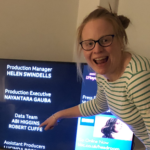My secondment at BBC News: I never appreciated how creative journalists are

Since graduating I have only ever worked in the Civil Service but always wondered what it would be like to work elsewhere. Fortunately, with the support of my manager, Deputy Director and the wide range of professional development opportunities in the Civil Service I have been lucky enough to complete a three-month analytical secondment at the BBC.
I was originally due to start in April 2020, but because of the pandemic this was postponed to January 2021. It has been a real privilege to be part of the BBC at a time when the pandemic has made accessible news critically important.
Throughout the secondment I have worked closely with Robert Cuffe (Head of Statistics), data journalists and senior representatives from across the different news outlets (TV, radio and online) to provide advice, check and highlight opportunities to improve the use of data. Although some of this was on statistics I was familiar with, the majority of the time I spent working on unfamiliar data which provided a fantastic opportunity to apply my analytical skills to something different, as well as picking up some new ones along the way!
Some of the things I have most enjoyed working on (and found equally challenging!) include daily and weekly coronavirus (COVID-19) data and providing statistics for TV, radio and online. These have covered a huge range of different topics including race, homelessness and migration. Alongside this I have also responded to bespoke requests such as providing advice on audience complaints and helped news teams with government statistical releases such as the labour market, attendance in schools and prison and probation quarterly releases.
At the end of each week, I took time to note down the main things I had worked on, and more crucially what I had learnt from them. Some of the take homes for me are:
- The speed and accuracy at which journalists work is truly phenomenal. Often, we would look at stats releases (as early as 7am) draft lines to be published or read on radio 10 minutes later! Working so quickly made me appreciate the value of key messages high up in releases. So often the focus would be getting these key messages out and then following on with the detail later.
- “What would I shout upstairs to my Mum?”. One of Robert’s well-known sayings! Audiences are engaged by a punchy top line, pick a top line and any further detail can feature further down. Asking yourself this question helps to focus on top lines which really matter.
- “Is it factually accurate? Is it helpful? And is it newsworthy?” Three important questions to ask when reporting on any statistics. A “no” to any of these means the data is probably not worth reporting on.
- Creativity. I never appreciated how creative journalists are, constantly being on the hunt for new exciting stories to tell. Weekly ideas meetings at the BBC provide an informal space to harness creativity and bounce ideas off each other.
Starting in January 21 amid the nation lockdown has meant I have not been to New Broadcasting House (something I plan to do when we are back to some kind of normality!). This has come with its own challenges including setting IT up remotely and worrying about pestering people to ask questions. But it also has had its advantages, I have not had to commute up to London every day and I have been able to shadow all aspects of statistical releases, something which just would not have been possible in the office.
Overall, I have had the best three months applying my analytical skills to a completely different setting whilst picking up new ones along the way. Although I am looking forward to returning to my normal job after Easter, I would thoroughly recommend a secondment to anyone!
